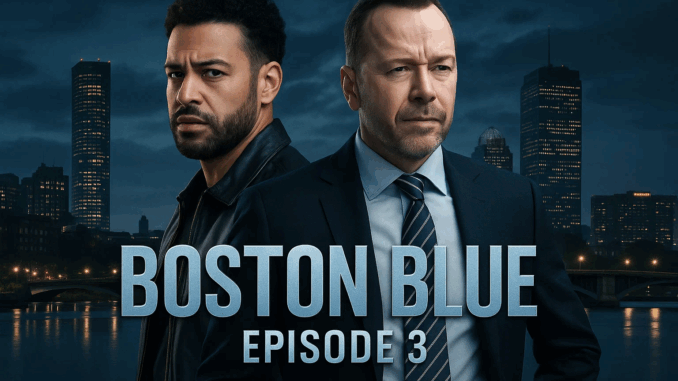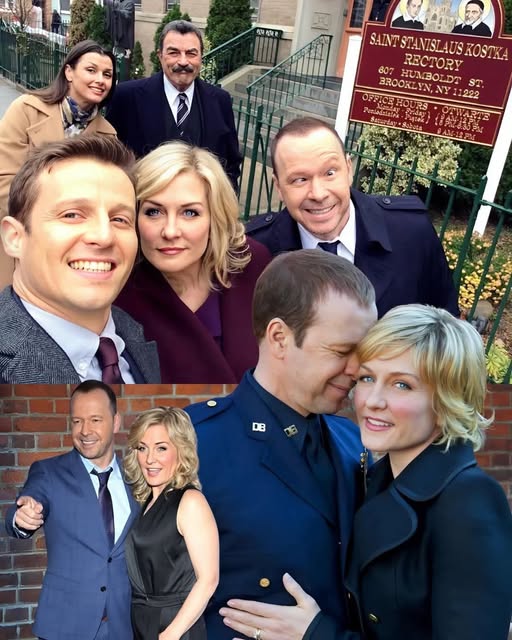
With its third episode, Boston Blue begins to find its rhythm and, more importantly, its emotional core. The Blue Bloods spinoff has been under heavy scrutiny since its premiere, but “Episode 3: Rival Lines” gives audiences a reason to believe that Danny Reagan’s post–New York journey has more to offer than nostalgia. Anchored by Donnie Wahlberg’s ever-grounded performance, the episode finally delivers an answer to a lingering question fans have debated since the pilot: can Danny move forward without losing the moral weight that defined him on Blue Bloods?
A Rival Cop and a Mirror Image
The episode introduces Detective Mark Fallon (guest star Jason Butler Harner), a brash and politically connected Boston PD officer who immediately clashes with Danny. Fallon represents everything Reagan despises — ambition without compassion, shortcuts justified by results. Their friction provides both narrative tension and a thematic mirror. Fallon’s tactics echo Danny’s own past impulses, forcing the veteran detective to confront his evolution since leaving New York.
Director Rachel Morrison frames their confrontations with deliberate tight shots and handheld realism, heightening the sense of professional suffocation. In one standout scene, Danny’s interrogation of a suspect is interrupted by Fallon’s interference, leading to a verbal sparring match that exposes the difference between instinct and integrity. Wahlberg’s delivery — calm but seething — recalls his best moments from Blue Bloods, yet with a newfound restraint that hints at maturity.
Storytelling Momentum
For the first time in Boston Blue, the writing feels confident about where Danny’s arc is headed. Series writer-producer Tom Szentgyorgyi, a Blue Bloods alum, balances procedural beats with internal conflict. The case itself — a robbery ring operating out of South Boston — isn’t particularly groundbreaking, but it serves as an effective backdrop for Danny’s internal reckoning.
By the episode’s midpoint, viewers realize that the “annoying rival cop” is less an antagonist than a narrative catalyst. Fallon’s presence forces Danny to acknowledge his own contradictions: his impulsiveness, his distrust of authority, and his tendency to bend the rules when he believes he’s right. The payoff comes in the final act when Danny, facing departmental pressure to overlook misconduct, refuses to compromise — a decision that reaffirms his integrity and marks a turning point in his Boston tenure.

Character Evolution and Thematic Closure
What makes this episode notable isn’t the crime-solving itself, but how it reframes Danny’s identity in a new environment. Wahlberg plays him not as a fish out of water, but as a man haunted by the cost of loyalty and loss. The episode subtly references his years in New York and the lingering absence of family ties, particularly the memory of his late wife Linda.
That emotional undercurrent gives added weight to his final confrontation with Fallon. In a rare moment of humility, Danny admits, “I used to be you — and it cost me too much.” It’s a line that bridges two series while defining Boston Blue on its own terms: a procedural about redemption, not repetition.
Cinematic and Tonal Shift
Visually, the show continues to distinguish itself from Blue Bloods. The warmer, more naturalistic lighting and Boston’s rugged cityscape replace the polished symmetry of New York. Morrison’s direction favors grounded realism — no dinner table monologues, no overt moral sermons — and that’s to the show’s benefit.
Still, the episode occasionally struggles with pacing. Some subplots, such as Lena Torres’ (Lauren Vélez) mentorship arc, feel rushed. Yet these moments are offset by Wahlberg’s charisma and the emerging chemistry among the ensemble cast. It’s not yet the well-oiled family dynamic of the Reagan clan, but the seeds are there.
What the Episode Answers and What It Promises
The “answer fans were waiting for” is not about who Danny is dating or what case he solves, but whether Boston Blue can justify its existence beyond franchise loyalty. Episode 3 suggests it can. By positioning Danny against a morally ambiguous rival, the series reclaims what made Blue Bloods enduring — the tension between justice and judgment — while adapting it to a grittier, less idealized world.
If the pilot was about reintroduction and Episode 2 about transition, Episode 3 is about definition. Danny Reagan is no longer just Tom Selleck’s protégé or the hot-headed NYPD detective; he’s a man evolving in real time, learning to temper conviction with empathy.
It’s a subtle, satisfying payoff that hints at stronger storytelling ahead. Whether the series can maintain this level of introspection remains to be seen, but for now, Boston Blue finally feels like it’s earned its own badge.